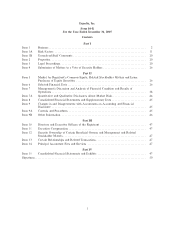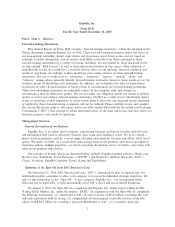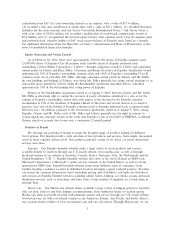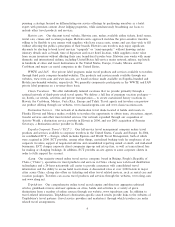Expedia 2005 Annual Report Download - page 18
Download and view the complete annual report
Please find page 18 of the 2005 Expedia annual report below. You can navigate through the pages in the report by either clicking on the pages listed below, or by using the keyword search tool below to find specific information within the annual report.Regulation S-K and the rules of the Nasdaq Stock Market, Inc. We intend to disclose any changes to the
code that affect the provisions required by Item 406 of Regulation S-K, and any waivers of the code of
ethics for our executive officers, directors or senior financial officers, on our corporate website.
Employees
As of February 28, 2006, we employed approximately 6,500 full-time and part-time employees of
whom approximately 1,800 are based at eLong. In addition, we contract for the services of approximately
350 employees of temporary staffing firms. Our employees are not represented by any collective bargaining
unit. We believe we generally have good relations with our employees.
Part I. Item 1A. Risk Factors
You should carefully consider each of the following risks and uncertainties associated with our
company and the ownership of our securities. Additional risks not presently known to us or that we
currently deem immaterial may also impair our business operations.
We operate in a very competitive environment and face increasing competition from a variety of
companies with respect to products and services we offer.
The market for the services we offer is intensely competitive. We compete with both established and
emerging online and traditional sellers of travel services with respect to each of the services we offer. Some
of our competitors, including travel suppliers such as airlines and hotels, may offer services and products
on more favorable terms such as no fees and with unique access to loyalty programs, such as points and
miles. Many of these competitors, such as airlines, hotel and rental car companies, are also focusing on
driving online demand to their own websites in lieu of third-party distributors like us. For instance, many
low cost airlines, which are having increasing success in the marketplace, distribute their inventory
exclusively through their own websites. Suppliers who sell on their own websites typically do not charge a
processing fee, and, in some instances, offer advantages such as bonus miles or loyalty points, which could
make their offerings more attractive to consumers than models like ours. The introduction of new
technologies and the expansion of existing technologies, such as metasearch products, may increase
competitive pressures. Increased competition may result in reduced operating margins, as well as loss of
travelers, transactions and brand recognition. We cannot assure you that we will be able to compete
successfully against current, emerging and future competitors or provide differentiated products and
services to our traveler base. Increased competition could result in reduced operating margins, loss of
segment share and damage to our brand. There can be no assurance that we will be able to compete
successfully against current and future competitors or that competition will not have a material adverse
effect on our business, results of operations and financial condition.
Over the last several years, travel suppliers have generally reduced or eliminated commissions and
payments to travel agents and other travel intermediaries; these reductions could adversely affect our
business, financial condition and results of operations.
A portion of our agency revenue is derived from compensation paid by travel suppliers and GDS
partners for bookings made through our websites. We generally negotiate these commissions and fees with
our travel suppliers and GDS partners. Over the last several years, travel suppliers have generally reduced
or eliminated commissions and payments to travel agents and other travel intermediaries. No assurances
can be given that GDS partners or travel suppliers will not reduce current industry compensation or our
compensation, either of which could reduce our agency revenue and margins thereby adversely affecting
our business, financial condition and results of operations. GDS partners in particular face renegotiations of
their long-term contracts with airlines in 2006 that could result in decreased compensation to them and to
us.
11
























